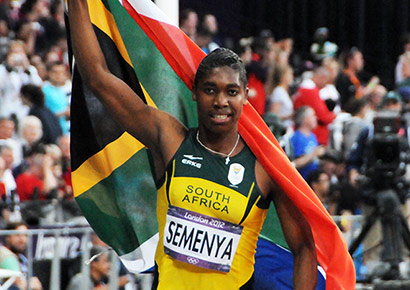Human Rights Watch calls for repeal of anti-Semenya running rules

Pic: Citizen59
Human Rights Watch has told the International Association of Athletics Federations (IAAF) that its recent regulations discriminate against some women athletes, such as Caster Semenya, and should be revoked.
The regulations, published in April, target women athletes with some intersex variations sometimes called “differences of sex development” that cause higher than typical natural testosterone levels.
Semenya, the South African Olympian and World Champion, is one of the women set to be affected by the controversial new policy.
Human Rights Watch said that the regulations deny these women the right to participate in the female category for running events between 400 meters and the mile unless they submit to invasive testing and medically unnecessary “treatment”. It noted that there is no clear scientific consensus women with intersex variations who have higher than typical natural testosterone have a performance advantage in athletics.
“The IAAF Eligibility Regulations for the Female Classification discriminate against women on the basis of their sex and their sex characteristics,” commented Liesl Gerntholtz, women’s rights director at Human Rights Watch. “Regulations that call for scrutiny of women’s naturally occurring hormone levels are at root a form of judgment and a questioning of women’s sex and gender identity.”
Intersex traits or variations are naturally occurring sex characteristics that appear in up to 1.7 percent of the population, but do not fit social norms of what is considered “male” or “female.” The vast majority of people born with intersex variations are healthy and do not need to undergo medical treatment unless they wish to alter their bodies, said the group.
The IAAF regulations require women who have a certain naturally occurring blood testosterone level to have medically unnecessary hormone therapy to reduce their testosterone levels if they want to qualify to compete in the female category.
If women refuse to be tested or have hormone therapy, the regulations state that they may only compete in the male category or in a hypothetical, not-yet-created intersex category – both of which would expose women’s private sex characteristics to the global public.
The United Nations special rapporteur on the right to health, Dainius Puras, has also expressed concern that “international and national sporting federations have…introduced policies banning women with testosterone levels exceeding a certain threshold from participating in competitive sport.” He noted that “there is insufficient clinical evidence to establish that those women have a ‘substantial performance advantage’ warranting exclusion.”
The practice of non-consensual “normalising” procedures conducted on people with intersex variations, such as to reduce the size of the clitoris, change the size and shape of the vagina, and remove gonads – which alters naturally occurring hormone levels – has been debunked as unscientific, unethical, and a violation of international human rights law. The discriminatory treatment of female athletes with intersex traits in sporting events similarly runs afoul of fundamental rights protections, Human Rights Watch said.
“Women with intersex variations have the same rights to dignity and bodily integrity as all women,” Gerntholtz argued. “But the new IAAF regulations coerce some women to undergo unnecessary medical intervention to alter their hormone levels simply because their naturally occurring testosterone is atypical.”
In June, Semenya filed a case with the Court of Arbitration for Sport in Switzerland challenging the controversial regulations as “discriminatory, irrational, unjustifiable.” She stated that, “I just want to run naturally, the way I was born. It is not fair that I am told I must change. It is not fair that people question who I am.”
“Stigmatising, stereotyping, and discriminating are intrinsic to the implementation of these regulations,” Gerntholtz said. “Identifying relevant athletes through observation and suspicion creates a situation in which women athletes’ bodies are scrutinised, while no such scrutiny is applied to men.”
Leave a Reply